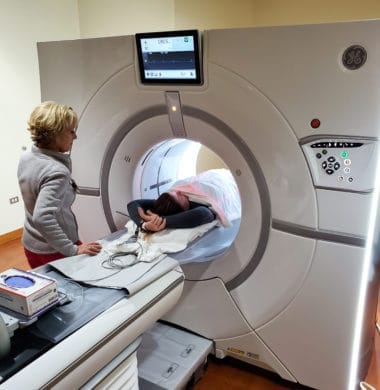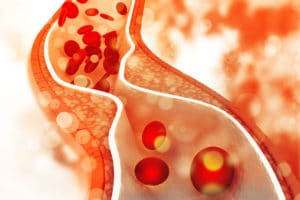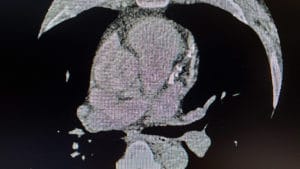What Is the Normal Range for a Calcium Heart Score?

What is a Calcium Heart Score?
Your calcium heart score measures the amount of plaque built up in the walls of the arteries in your heart. The cholesterol that deposits in the arterial walls becomes calcified, and this calcium can be detected by a CT scanner, just like X-rays can look at the calcium of your bones. A significant calcium buildup can indicate that you’re developing dangerous plaque levels in your arteries, which can increase your risk of a heart attack. Therefore, determining your calcium heart score can be an important way to predict the likelihood of a future heart attack.
The plaque in your heart arteries is different than the plaque found in your teeth. The plaque in your arteries is composed of a combination of fat and calcium, and it can be harmful to your heart. At first, this plaque is waxy. However, it hardens over time, creating two serious issues for your heart health:
- It clogs your arteries, which will slow your blood flow and prevent certain areas of your body from receiving proper levels of oxygen
- It can cause a blood clot which may trigger a heart attack
Why is a Calcium Heart Score Test Important?
A calcium heart score test is performed to identify the amount of calcified plaque in your heart’s arteries. An elevated calcium heart score may indicate that you need to make certain lifestyle adjustments to reduce your risk of a heart attack.
Technically, a normal calcium score is 0, meaning you don’t have any calcified plaque in your arteries. However, as they age, most people develop some plaque in their arteries.
Interpreting Your Calcium Heart Score
Calcium heart scores, also called Agatston scores (named after the physician who came up with this idea), range from 0 to above. Higher scores indicate more significant evidence of plaque deposits inside the lining of your heart arteries. As a result, a higher score also equates to a greater likelihood of having a heart attack or stroke down the road.
You can interpret your calcium heart score based on the following continuum:
- 0 = no calcified plaque detected (risk of coronary artery disease is very low – less than 5%)
- 1-10 = calcium detected in extremely minimal levels (risk of coronary diseases is still low – less than 10%)
- 11-100 = mild levels of plaque detected with certainty (minimal narrowing of heart arteries is likely)
- 101-300 = moderate levels of plaque detected (relatively high risk of a heart attack within 3-5 years)
- 300-400 = extensive levels of plaque detected (very high risk of heart attack, high levels of vascular disease are present)
What is a Good Calcium Heart Score?
Because there is a continuum for this diagnostic measurement, it’s hard to identify a “normal range” for your calcium heart score. Rather, it’s best to view your score in terms of identifying your relative risk level of heart disease and how critical it will be to make adjustments in your lifestyle.
A high calcium heart score indicates the need to develop a plan with your doctor in order to lower your risk of a heart attack or other serious heart issues. In some instances, your doctor may recommend additional tests to better understand the severity of your coronary plaque buildup. In addition, your doctor may recommend certain lifestyle adjustments associated with your:
- Diet
- Frequency of exercise
- Medication regimen
It’s also useful to compare your calcium heart score to other individuals of the same gender, ethnicity, and age. You can use this calculator to view the percentile of your calcium score for these demographic categories.
Can You Lower Your Calcium Score?
In this short video, Dr. Paul Jurgen, a Preventive General Cardiologist here at South Denver Cardiology, explains how to reduce your risk of a heart attack using the data from your Calcium Heart Score.
South Denver Cardiology Associates Can Help
Undergoing a calcium heart test is an effective way to detect heart disease in its earliest stages. The test is non-invasive and can have a significant impact on our ability to prevent future heart attacks. We recommend a calcium heart score test for women over age 40 and men over age 35 who possess at least two of the following risk factors:
- Diabetes
- High blood pressure
- High cholesterol
- Elevated triglycerides
- Elevated LDL
- Low HDL levels
- Sedentary or stressful lifestyle
- Family history of heart disease
- Current or former smoker
- Obesity
South Denver Cardiology Associates offeoffers comprehensivediovascular diagnostic and treatment programs. Our diagnostic team can administer the test at our state-of-the-art facility. The entire test is completed in under five minutes and is painless. Your calcium heart score will be processed immediately and reviewed by one of our highly trained cardiac nurses and a radiologist. A report of their findings will be sent to your physicians.
Schedule a Calcium Heart Score Test
Please contact South Denver Cardiology Associates today to schedule a calcium heart score test. We serve patients in Denver, Littleton, and the surrounding areas of Colorado.
- 9 Tips to Reduce Holiday Stress - December 11, 2025
- 6 Tips for Exercising Outdoors with a Heart Condition - May 19, 2025
- Lifestyle Changes That Can Help Manage Arrhythmia - April 30, 2025



